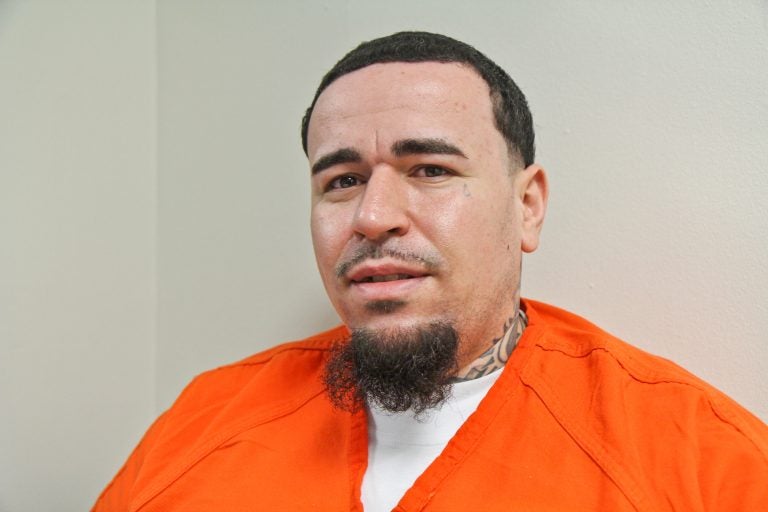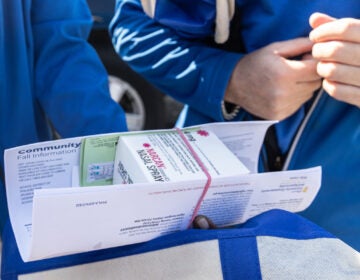Camden County Jail inmates get jump-start on re-entry help
Thirty-four Camden County Jail inmates have been tapped to participate in the Co-Occurring Reentry Program for those with mental health and substance use problems.
Listen 3:53
William Rivera, 37, has been incarcerated more than 40 times since he was 10. Today, he’s coming home with hope and help from a new program that aims to treat Rivera’s addiction. (Kimberly Paynter/WHYY)
After eight and a half months, William Rivera was leaving the Camden County Jail.
He’s been inside many times before, between 40 and 50 stints — if you include all the times he was incarcerated as a youth.
This latest time was for burglary. Rivera, 37, said he stole to buy heroin.
“I’m doing that to support my habits,” Rivera said. “I don’t never want to do that no more. I’m trying to do things positive, not negative.”
The Camden County Jail recently launched a program for inmates who, like Rivera, have substance use disorder and mental health issues.
The Co-Occurring Reentry Program (CORP) connects inmates with re-entry specialists — case managers who specialize in the challenges specific to leaving incarceration and rebuilding a life on the outside.
In the program, administrators assess inmates to identify what they need to succeed outside of jail — be it housing, employment, addiction treatment, or health care.
The program work begins when people are sentenced, once they have some idea of how long they’ll be incarcerated.
Program staffers stay connected with inmates through their release — and beyond.
The program is funded by a three-year, $650,000 grant from the U.S. Department of Justice.
Building an early relationship
Camden County has spent the last year and a half planning the model, and began identifying people who fit the bill in March.
Rivera says so far, his re-entry specialist has helped with basic logistics such as getting him state-issued identification that he’ll need to access social services. The specialist also helped him work on his resume.
Sharon Bean, the jail population manager for the Camden County Correctional Facility, heads re-entry initiatives at the jail, including CORP. As re-entry programs gain popularity, she said, this one is distinct: Most re-entry work happens at the state and federal prison level, and not yet in local jails. Also, CORP’s work starts while people are still incarcerated.
“There’s no reason to wait until they’re released to identify — oh, you don’t have a birth certificate, you don’t have photo identification, which all adds up,” Bean said.
“Those little barriers and challenges really prevent access to substance use treatment, access to mental health treatment.”
David Owens, director of the Camden Department of Corrections, agreed that building the relationship early is crucial.
“The first two weeks of freedom outside of the facility is critical,” he said. “If we can connect people while they’re incarcerated and give them a support group — then that really can help us break the cycle.”
Bean said CORP is structured so that a re-entry specialist is literally at the door of the jail as a person is released.
“Whatever was the first thing that was identified — if it’s housing, they’re connecting him to housing and making sure they have a place to stay tonight. And then there’s a plan for, what are you doing tomorrow?” Bean said.
From there, the re-entry specialist coordinates with Camden-based health organizations, housing agencies and education providers. And those service providers — who have a contract with the jail — prioritize appointments for former inmates.
The re-entry specialists stick with participants for up to a year after his or her release.
“You can think of a relay race where the baton is passed, and people run a leg to provide that service,” Owens said.
For William Rivera, the plan is getting into narcotics anonymous meetings, starting a job he has lined up at a butcher shop, and reconnecting with his fiancée.
Re-entry programs in jails are unusual but do exist — at the end of 2017, New York City jails began case management with all inmates from the day they enter the facility.
In Rhode Island, some jails give out the overdose-recovery medicine naloxone to inmates. And a recent study found that the program reduced deaths.
Coordinating care for mental illness, addiction
In Camden, CORP focuses on people with co-occurring mental health and substance use issues. It’s unique for a city that has limited addiction recovery resources.
Cooper Addiction Medicine and Project HOPE offer medication-assisted treatment, but Camden’s needle-exchange program closed in 2016. And the FBI recently raided the methadone clinic, though it’s still operating. There have been 119 suspected overdose deaths so far this year in Camden.
In 2015, 24 percent of inmates in Camden County Jail had been incarcerated there within the previous year.
CORP is not alone in working with inmates leaving the jail. The Camden Coalition has its own re-entry program with different criteria, along with the VOA and Oaks Integrated Care. Those help organizations meet every two weeks to make sure they are coordinating efforts and avoiding redundancies.
Owens said about 20 percent of inmates in Camden County Jails have serious mental illness, a number that’s gone up in recent years. About 60 percent of the jail population has substance use disorder, he said.
Until recently, when inmates entered the jail, they were screened for both mental health and substance use issues and placed in a treatment track for one or the other.
That decision prevented coordinated care for people who needed both kinds of help.
In a recent study, the Camden Coalition of Healthcare Providers found that two thirds of people who cycled in and out of jails also cycled in and out of hospitals, illustrating the overlap between unmet health needs and incarceration.
“We don’t know whether it is the drugs driving the mental health or the mental health driving the drugs, and with programs like this we’re able to devote some time to finding that out,” Owens said.
The jail is also gearing up to offer medication-assisted treatment for people with substance use disorder. It is not available as an option for people in CORP yet, but Warden Karen Taylor said Vivitrol would be available soon.
She said that corrections officers have been supplied with and trained in using naloxone, the opioid reversal drug, in the event that inmates sneak drugs into the jail and overdose, which has happened in nearby counties.
At the Camden jail, the inmate population is roughly 1,400 and the plan is to serve about 190 people each year through CORP. So far, there are 34 participants, three have been released, and Rivera is No. 4.
In all the times he has been incarcerated, William Rivera said he’s never had the opportunity to be in a program like this one.
As we finished talking, he closed our conversation with a word of advice for others.
“People that’s struggling out there, just ask for help. That’s it,” he said.
As Rivera got up to leave, the lieutenant, sergeant, and other bystanders, all wished him good luck.
WHYY is your source for fact-based, in-depth journalism and information. As a nonprofit organization, we rely on financial support from readers like you. Please give today.




